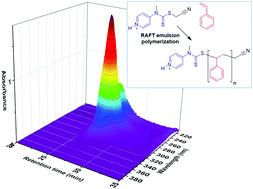Ab initio RAFT emulsion polymerization mediated by small cationic RAFT agents to form polymers with low molar mass dispersity†
Abstract
We report on low molar mass cationic RAFT agents that provide predictable molar mass and low molar mass dispersities (Đm) in ab initio emulsion polymerization. Thus RAFT emulsion polymerization of styrene in the presence of the protonated RAFT agent, ((((cyanomethyl)thio)carbonothioyl)(methyl)amino)pyridin-1-ium toluenesulfonate (4), and the analogous methyl-quaternized RAFT agents, 4-((((cyanomethyl)thio)carbonothioyl)(methyl)amino)-1-methylpyridin-1-ium dodecyl sulfate (6), provide low dispersity polystyrene with Đm 1.2–1.4 for Mn ∼ 20 000. We postulate that the success of ab initio emulsion polymerization with 4 is due to the hydrophilicity of the pyridinium group, which is such that the water soluble RAFT agent partitions predominantly into the aqueous phase under the conditions of the experiment and that 4 provides little retardation. With 6, when the counterion is dodecyl sulfate, we can achieve “surfactant-free” RAFT emulsion polymerization to provide a low Đm polystyrene. However, the RAFT end-group is lost on isolation of the polymer. Preliminary results show that this class of RAFT agent is broadly applicable in ab initio emulsion polymerization of other more-activated monomers (e.g., butyl acrylate, butyl methacrylate). Furthermore, cyanomethyl(pyridin-4-yl)carbamodithioate (3, the RAFT agent in neutral form) provides molar mass control and Đm < 1.8 in ab initio emulsion polymerization of less activated monomers, specifically, the vinyl esters, vinyl acetate and vinyl benzoate.



 Please wait while we load your content...
Please wait while we load your content...